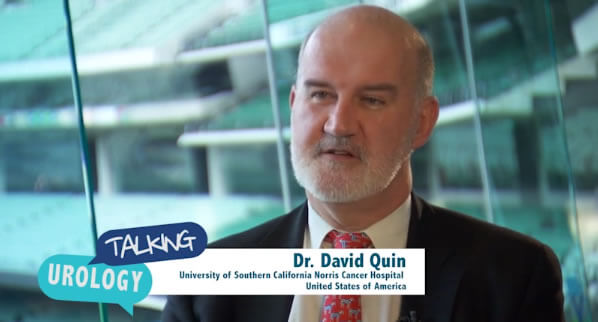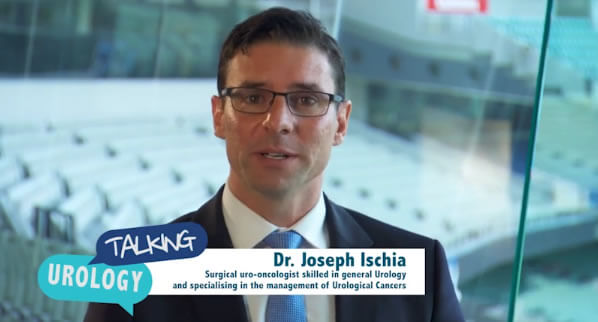Dr Alison Birtle & Prof Ian Davis discuss the development and execution of the phase 3 POUT trial which has set the new standard of the benefit of adjuvant chemotherapy in men with locally advanced upper tract urothelial cancer after nephro-ureterectomy.
Dr Alison Birtle ia a consultant clinical oncologist and honorary senior lecturer at the Rosemere Cancer Centre, Lancashire teaching hospitals, Preston, specialising in the treatment of urological cancers. She is an advisor to Macmillan on patient information for prostate, bladder and testicular tumours, Trustee and medical advisor to Fight Bladder cancer, and secretary to the British Uro Oncology Group. Alison has been a clinical research lead for Lancashire and South Cumbria Cancer Research Network, and more recently, associate clinical lead for Cancer Research and since March 2018, specialty group lead for Cancer Research for North West Coast CRN.
Talking Urology podcast transcript
ANZUP 2019 Interviews – Ian Davis and Alison Birtle
Ian Davis: Hello, my name is Ian Davis. I’m chair of ANZUP Cancer Trials Group and I’m talking to you from the ANZUP Annual Scientific Meeting held in Brisbane in July 2019 and it’s a great pleasure to be here with Alison Birtle, all the way from the UK, one of our eminent invited speakers. Thank you for coming Alison. Welcome.
Alison Birtle: You’re very welcome. I’m delighted to be here and very pleased to be able to talk a bit about the trials that I’ve been involved with and about ANZUP.
Ian: So, Alison you’re probably best well known for the POUT clinical trial. Can you give us an update on what you have talked about today?
Alison: So, in the session this morning, we were talking about making connections which is the whole theme of ANZUP 2019. My thing was to talk about how we connect trail networks, particularly for studies where we’ve got a low incidence and there are a number of themes that you need to look at for that in terms of, is there an unmet need because the trial has to be something that people really want to do, otherwise there’s no point in doing it no matter how great the idea seems to be for us as clinicians. Then we have to involve the clinicians who are going to be doing the study and the patients so that we get the design right before we ever go near a funding body for that.
One of the things we did with the POUT trial was that we did audits of practice across the UK. We wanted to know were people currently giving adjuvant chemotherapy to patients after nephroureterectomy for upper tract TCC or were they surveying the patients? And if they were doing either of those, would they be prepared to enroll the patients in a clinical study? We found out, yes, people were doing either surveillance or chemotherapy but they didn’t know whether what they were doing was right and so we had the basis that the oncologists being on board.
The second thing was to say, “Well, what do we need to do if the patients are node positive? Do they need a node dissection? Should they just do a macroscopic removal of visible nodes? And the urologists across the UK said, “Well, you know, there’s no level 1 evidence to say that we should do a nodal dissection and we’re not going to do one.” So, that meant that the study could pragmatically do what the surgeons wants to do.
I we asked the patients. So, we convened a focus group of patients who were either known to those of us who are clinicians and they have had a nephroureterectomy or we recruited them through the Macmillan Cancer Voices websites. We asked these patients three questions; would you prefer neoadjuvant chemotherapy or adjuvant and we obviously explained that in lay peoples’ terms. Would you accept chemotherapy and would you accept surveillance? We also asked the same questions to the oncologists about neoadjuvant or adjuvant treatment and you know there was a resounding agreement between physicians and patients that they wouldn’t support a neoadjuvant study because they wanted to know that they had nasty cancer that needs to have more treatment rather than well they might have got invasive cancer but they couldn’t be quite certain based on preoperative imaging. So, that’s how we had the original basis for the study to then go on and get funding.
Ian: So, one of we really inspiring things about this is the fact that you did have such great engagement of clinicians but also the patients at the center of all of this, but you’re also a full-time working clinician, so people who are trying to set up a practice changing study like this, what sort of lessons can they learn and what suggestions would you have?
Alison: I think you have to be so committed. You know yourself if you’re going be a chief investigator on a study particularly on an academic study, that you have to be available pretty much all the time. So, in things of safety reporting, you have to sign them off. People need to know where you are or you have to have delegated that if you’re on holiday and you have to report on that within 24 hours of at the safety reporting coming through. But it’s about things like the protocol, the submission for ethics, they will take a lot of time. You have to be hugely organized and committed and make certain that you time manage appropriately, particularly if you’ve got a busy clinical job.
I think the important thing is you’ll know yourself is that you have to invest you into a study and put your heart and soul into it. So, the trials units are fantastic. I was so lucky to work with the Institute of Cancer Research clinical trials and statistics unit. But no matter how good a trials unit is, you as their CI have to invest you. So, if you’re more likely to get somebody looking at barriers to recruitment, if I contact them, if I email Fred Smith at the hospital in South End or wherever and say, “Look, I can see that you’ve not opened the POUT trial, tell me about the barriers to recruitment locally? How can I as the chief investigator help? What information do your local team needs to be able to get the study open?” And there’s no doubt that that personal touch really helps push things forward.
I mean, we had the POUT study, which as you know, is a positive study with a 17% improvement in disease-free survival in favor of chemotherapy given adjuvantly after nephroureterectomy. The study was open across the UK, 75 centers open, 57 recruits at least one patient and every single patient counted. It’s a bit like points make prizes. Patients just one at a time building them up for niche studies. We’re not talking studies of a thousand patients. This was 261 patients but both centers here recruited even one patient made a real difference to the success of the study.
Ian: Yes. I think that level of personal investment and commitment was really important. So, what comes next for you now?
Alison: Well, the manuscripts for the study is about to go in. It’s taken a bit more time. We were cleaning some of the data and the overall survival data is currently being collected. I don’t think it’s that far off. So, we’re going move on to the successor study, the POUT 2 trial which I’m delighted that ANZUP are really keen to be part of. And now we have a standard of care which is adjuvant chemotherapy, four cycles, either with GemCis or GemCarbo. One of the barriers we had for recruitment in the first study was that patients didn’t want chemotherapy. Well, now we’ve got a standard of care to say, “Well, that’s what you should have.” And the obvious thing to do is to have an experimental arm adding in an IO to the adjuvant chemotherapy, so that’s the next study really.
Ian: That sounds very exciting. Thank you, Alison, for coming all this way taking time out of your very very busy life and sharing this information and insights with us. It’s wonderful to have you.
Alison: You’re very welcome.
Ian: That’s all from us today. Look out for more great interviews from ANZUP ASM 2019










